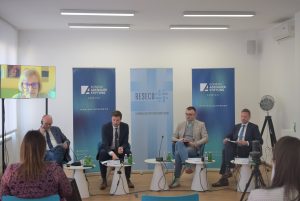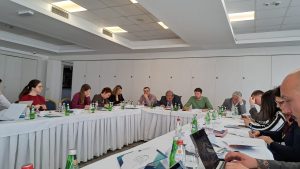The fourth debate within the PolitiKAS debate program with young MPs, entitled “Securitization of various crises and the Power of Parliamentary Debate: The Impact of the War in Ukraine,” was held on November 25, 2022, in the premises of the Konrad Adenauer Foundation in Belgrade.
Young MPs had the opportunity to discuss current topics related to inter-party dialogue in the parliamentary life of Serbia and why it is especially important in times of crisis?; About the war in Ukraine and what has changed in the European context; what is the view of the European Parliament on the current foreign policy position of Serbia and regional cooperation in the context of the global crisis brought about by the war in Ukraine.
One of the speakers, assistant professor at the Faculty of Political Sciences, University of Belgrade, Stefan Surlić, in his introductory presentation, pointed out that in the last few years, European countries have faced various crises, that have successively led to a certain type of securitization. With an explanation of securitization as a process in which certain phenomena are placed in the context of a security crisis, he stated that crises have proven to be a strong disruptive factor in the cooperation of the countries of the Western Balkans.
The second speaker was Jan-Willem Vlasman, foreign policy adviser and rapporteur for Serbia in the caucus of the European People’s Party and in the committee for foreign affairs of the European Parliament. Mr. Vlasman emphasized the importance of the parliament in crisis situations, presenting the work of the European People’s Party (EPP) in the European Parliament but also the possibility for parliamentarians from Serbia to actively cooperate with the EPP and, through their engagement, point out the challenges facing Serbia. He additionally emphasized the importance of inter-party dialogue and the necessity of finding a way to continue and maintain it.
Aside from the characteristics and consequences of each crisis for the region, speaker Surlic emphasized two dominant discourses since the beginning of the war in Ukraine: the first, identification with Ukrainians in the context of the Balkan wars of the 1990s; and the second, traditional enemies who are always hostile towards the Western Balkans, particularly towards Serbia.
Parallels between Serbia and Russia are often drawn so that Serbia will repent as an aggressor in the Balkans and that Serbia will use this situation to increase its territories. Even though the region’s countries used incorrect rhetoric, it is clear that the EU is primarily focused on the destruction of Serbia, creating a defeatist attitude and a completely false image among Serbian citizens that Serbia has no partner or interest in building partnership relations with the EU.
The main conclusion of this discussion is the need for more intensive cooperation and continuous dialogue between the leaders of the Western Balkans in order to provide a successful, regional response to crises through the elimination of defeatist attitudes and the securitization of problems.
*The project is organized by the RESECO think-tank and the Konrad Adenauer Foundation with the support of the Eduardo Frei Foundation.






